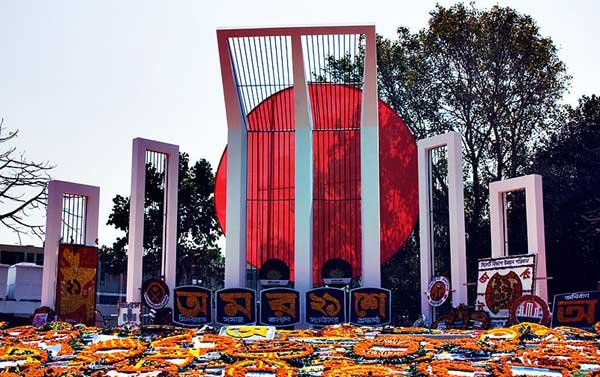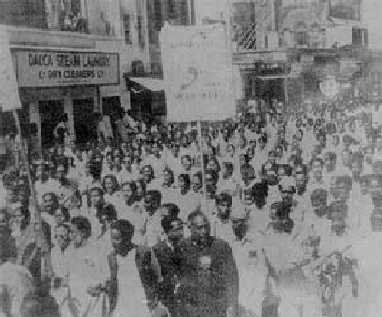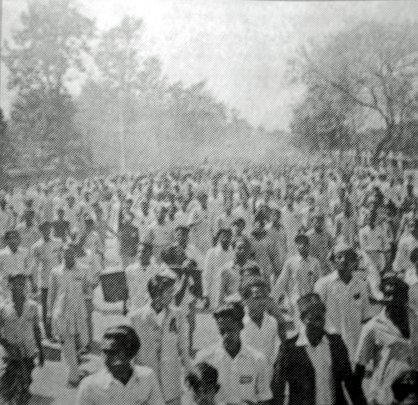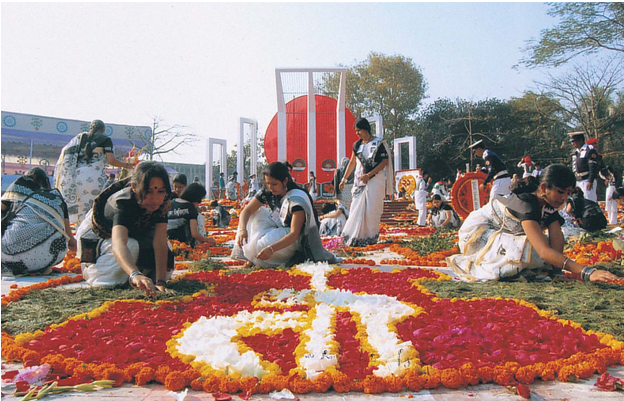
International Mother Language Day (IMLD) is a worldwide annual observance held on 21 February to promote awareness of linguistic and cultural diversity and to promote multilingualism. First announced by UNESCO on 17 November 1999, it was formally recognized by the United Nations General Assembly with the adoption of UN resolution 56/262 Multilingualism in 2002. Mother Language Day is part of a broader initiative "to promote the preservation and protection of all languages used by peoples of the world" as adopted by the UN General Assembly on May 16, 2007 in UN resolution 61/266, which also established 2008 as the International Year of Languages.The idea to celebrate International Mother Language Day was the initiative of Bangladesh. In Bangladesh 21st February is the anniversary of the day when Bangladeshis fought for recognition for the Bangla language.

History :
This article is about the movement in Bangladesh. For the movement in India, see Bengali language movement in India.
The Bengali Language Movement (Bengali: ভাষা আন্দোলন Bhasha Andolôn) was a political movement in former East Bengal (renamed East Pakistan in 1956 and Bangladesh in 1971) advocating the recognition of the Bengali language as an official language of the then-Dominion of Pakistan in order to allow its use in government affairs, the continuation of its use as a medium of education, its use in media, currency and stamps, and to maintain its writing in the Bengali script.
When the Dominion of Pakistan was formed by the partition of India in 1947, it was composed of various ethnic and linguistic groups, with the geographically non-contiguous East Bengal province having a mainly Bengali population. In 1948, the Government of the Dominion of Pakistan ordained Urdu as the sole national language, sparking extensive protests among the Bengali-speaking majority of East Bengal. Facing rising sectarian tensions and mass discontent with the new law, the government outlawed public meetings and rallies. The students of the University of Dhaka and other political activists defied the law and organised a protest on 21 February 1952. The movement reached its climax when police killed student demonstrators on that day. The deaths provoked widespread civil unrest. After years of conflict, the central government relented and granted official status to the Bengali language in 1956.
The Language Movement catalysed the assertion of Bengali national identity in East Bengal and later East Pakistan, and became a forerunner to Bengali nationalist movements, including the 6-Point Movement and subsequently the Bangladesh Liberation War and the Bengali Language Implementation Act, 1987. In Bangladesh, 21 February (Ekushey February) is observed as Language Movement Day, a national holiday. The Shaheed Minar monument was constructed near Dhaka Medical College in memory of the movement and its victims. In 1999, UNESCO declared 21 February as International Mother Language Day, in tribute to the Language Movement and the ethno-linguistic rights of people around the world.
"By bringing their speakers closer together, by allowing them to flourish in a shared context, mother tongues generate social inclusion, innovation and imagination. They also breathe life into cultural diversity and serve as instruments of peace."
— Audrey Azoulay, Director-General of UNESCO, on the occasion of International Mother Language Day
Events of 1952
The Urdu-Bengali controversy was reignited when Jinnah's successor, governor-general Khawaja Nazimuddin, staunchly defended the "Urdu-only" policy in a speech on 27 January 1952. On 31 January, the Shorbodolio Kendrio Rashtrobhasha Kormi Porishod (All-Party Central Language Action Committee) was formed in a meeting at the Bar Library Hall of the University of Dhaka, chaired by Maulana Bhashani. The central government's proposal of writing the Bengali language in Arabic script was vehemently opposed at the meeting. The action committee called for an all out protest on 21 February, including strikes and rallies. In an attempt to prevent the demonstration, the government imposed Section 144 in Dhaka, thereby banning any gathering.
21 February

At nine o'clock in the morning, students began gathering on the University of Dhaka premises in defiance of Section 144. The university vice-chancellor and other officials were present as armed police surrounded the campus. By a quarter past eleven, students gathered at the university gate and attempted to break the police line. Police fired tear gas shells towards the gate to warn the students. A section of students ran into the Dhaka Medical College while others rallied towards the university premises cordoned by the police. The vice-chancellor asked police to stop firing and ordered the students to leave the area. However, the police arrested several students for violating section 144 as they attempted to leave. Enraged by the arrests, the students met around the East Bengal Legislative Assembly and blocked the legislators' way, asking them to present their insistence at the assembly. When a group of students sought to storm into the building, police opened fire and killed a number of students, including Abdus Salam, Rafiq Uddin Ahmed, Sofiur Rahman Abul Barkat and Abdul Jabbar. As the news of the killings spread, disorder erupted across the city. Shops, offices and public transport were shut down and a general strike began. At the assembly, six legislators including Manoranjan Dhar, Boshontokumar Das, Shamsuddin Ahmed and Dhirendranath Datta requested that chief minister Nurul Amin visit wounded students in hospital and that the assembly be adjourned as a sign of mourning.This motion was supported by some treasury bench members including Maulana Abdur Rashid Tarkabagish, Shorfuddin Ahmed, Shamsuddin Ahmed Khondokar and Mosihuddin Ahmed . However, Nurul Amin refused the requests.
22 February

Disorder spread across the province as large processions ignored section 144 and condemned the actions of the police. More than 30,000 people congregated at Curzon Hall in Dhaka. During the continued protests, police actions led to the death of four more people. This prompted officers and clerks from different organisations, including colleges, banks and the radio station, to boycott offices and join the procession. Protesters burned the offices of two leading pro-government news agencies, the Jubilee Press and the Morning News. Police fired on a major janaza, or mourning rally, as it was passing through Nawabpur Road. The shooting killed several people including activist Sofiur Rahman and a nine-year-old boy named Ohiullah.
Independence of Bangladesh
Although the question of official languages was settled by 1956, the military regime of Ayub Khan promoted the interests of West Pakistan at the expense of East Pakistan. Despite forming the majority of the national population, the East Pakistani population continued to be under-represented in the civil and military services, and received a minority of state funding and other government help. This was mainly due to lack of representative government in the fledgling state. Mainly due to regional economic imbalances sectional divisions grew, and support for the Bengali ethnic nationalist Awami League, which invoked the 6-point movement for greater provincial autonomy. One demand was that East Pakistan be called Bangladesh (Land/Country of Bengal), which subsequently led to the Bangladesh Liberation War.

BANGLADESH
The Language Movement had a major cultural impact on Bengali society. It has inspired the development and celebration of the Bengali language, literature and culture. 21 February, celebrated as Language Movement Day or Shohid Dibosh (Martyrs' Day), is a major national holiday in Bangladesh. A month-long event called the Ekushey Book Fair is held every year to commemorate the movement. Ekushey Padak, one of the highest civilian awards in Bangladesh, is awarded annually in memory of the sacrifices of the movement. Songs such as Abdul Gaffar Choudhury's Ekusher Gaan, set to music by Shaheed Altaf Mahmud, as well as plays, works of art and poetry played a considerable role in rousing the people's emotions during the movement. Since the events of February 1952, poems, songs, novels, plays, films, cartoons and paintings were created to capture the movement from varied point of views. Notable artistic depictions include the poems Bornomala, Amar Dukhini Bornomala and February 1969 by Shamsur Rahman, the film Jibon Theke Neya by Zahir Raihan, the stage play Kobor by Munier Chowdhury and the novels Ekushey February by Raihan and Artonaad by Shawkat Osman.
Two years after the first monument was destroyed by the police, a new Shaheed Minar (Monument of Martyrs) was constructed in 1954 to commemorate the protesters who lost their lives. Work on a larger monument designed by the architect Hamidur Rahman began in 1957 with the support of the United Front ministry. Hamidur Rahman's model consisted of a large complex in the yard of the Dhaka Medical College Hostel. The design included a half-circular column symbolizing a mother with her martyred sons standing at the dais in the centre of the monument. Although the imposition of martial law in 1958 interrupted the work, the monument was completed and inaugurated on 21 February 1963 by Abul Barkat's mother, Hasina Begum. Pakistani forces demolished the monument during the Bangladesh Liberation War of 1971, but the Bangladeshi government reconstructed it in 1973. Ekushey Television, the first private terrestrial TV channel of Bangladesh was named after the Event of 21 February.
Bangladesh officially sent a proposal to UNESCO to declare 21 February as International Mother Language Day. The proposal was supported unanimously at the 30th General Conference of UNESCO held on 17 November 1999.
Now every year on 21 february people from all over the world celebrate International Mother Language Day .
